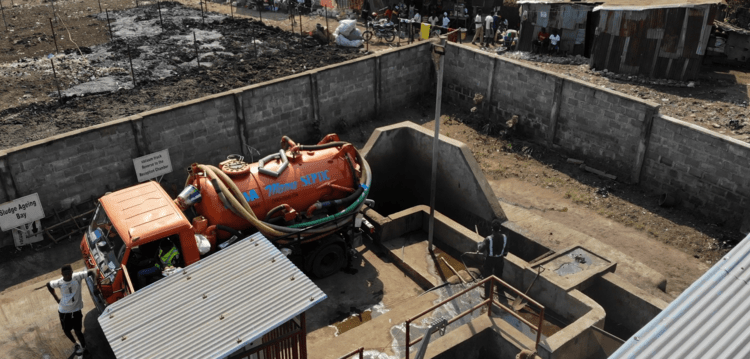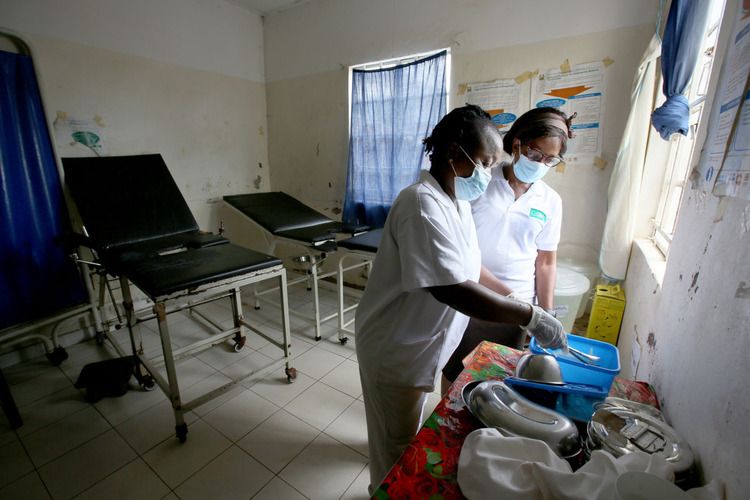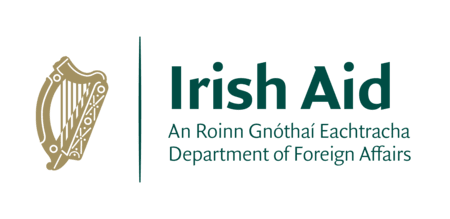 Blogs
Blogs
July 9, 2024 • 5 min read
Irish Aid is the Government of Ireland’s overseas development aid programme. Through the five-year “Irish Civil Society Partnership for a Better World” funding scheme, the Irish government supports long-term humanitarian and development programmes around the world. Irish Aid funds GOAL’s work in ten countries. Recently, representatives from Irish Aid visited several of our ICSP-funded projects in Sierra Leone.
Freetown’s Faecal Sludge Management Plant
Recently, representatives from Irish Aid visited several GOAL projects funded by the Ireland Civil Society Partnership programme.
In 2021, GOAL completed the development of Sierra Leone’s first-ever wastewater treatment plant in Freetown, a city with a population of over one million people. Previously, human waste was dumped, untreated, into a nearby landfill. The faecal waste seeped into the ground, infiltrating local waterways that flowed through some of Freetown’s most disadvantaged neighbourhoods.
The Irish Aid Civil Society Partnership for a Better World programme now supports the ongoing management and operations of the faecal sludge management (FSM) plant, which treats 22% of the city’s total liquid waste. In 2023, the plant treated 15.8 million litres of faecal waste.
During the visit, Andruga Williams, a WASH (water, sanitation, and hygiene) and Climate Change Coordinator for GOAL Sierra Leone, shared plans to expand the plant with representatives from Irish Aid.
To combat deforestation and protect the environment, our teams are developing several innovative waste-to-energy solutions using faecal sludge. One solution is home biogas technology, which allows households to turn their liquid waste into renewable energy. As the organic waste decomposes, the gas is captured and turned into renewable energy that can be used as clean cooking gas, or even to power a generator. Dried faecal sludge is also being turned into cooking briquettes, which are a clean and environmentally friendly alternative to wood or charcoal.
These innovative waste-to-energy solutions will contribute to climate change mitigation efforts in Sierra Leone as greenhouse gas emissions will be avoided by the transition to clean and renewable energy sources.
Representatives also met with the Mayor of Freetown, Yvonne Aki-Sawyer. Our work in Sierra Leone, funded by the ICSP, is implemented in close partnership with the local government to ensure long-term viability. Ownership and maintenance of the plant will eventually be transferred to Freetown City Council.

The Faecal Sludge Management (FSM) plant in Freetown is located next to one of the city’s most vulnerable neighbourhoods, Kingtom. Before the plant was constructed, untreated waste used to be dumped on this site.
Health System Strengthening
Representatives from Irish Aid also visited Kenema District in Sierra Leone’s Eastern Province. Here, GOAL is actively working to strengthen local health systems and improve the availability of high-quality healthcare for adolescents, mothers, and infants.
Sierra Leone faces significant health challenges, with one of the highest maternal mortality rates in the world—approximately 1,360 deaths per 100,000 births. For comparison, Ireland’s rate is five deaths per 100,000 births.
Additionally, Sierra Leone has one of the highest adolescent pregnancy rates globally, with pregnancy-related complications being the leading cause of death for young women. An alarming 46.8% of adolescent deaths in Sierra Leone are due to pregnancy and childbirth complications.
In remote areas like Kenema, peripheral healthcare unit (PHU) staff often lack the necessary knowledge and technical expertise to manage urgent childbirth complications. Consequently, mothers with complications are transferred to Kenema Regional Hospital, which is a two-hour journey that many do not survive.
To address these issues, the Irish Aid Civil Society Partnership for a Better World programme is funding a peer-led clinical mentorship initiative aimed at improving health services in these regions. This programme, implemented in partnership with the Sierra Leone Ministry of Health, enhances clinical skills and knowledge while fostering supportive relationships between healthcare providers and the local community. This approach improves both the quality and uptake of health services.
Last year, with support from Irish Aid, the clinical mentorship programme was expanded to two additional districts. Sixteen new mentors were onboarded in Bombali and Kambia, who now provide clinical mentorship in emergency obstetrics to 52 healthcare workers across 26 PHUs in the region.
GOAL is also implementing various programmes to reduce adolescent pregnancy. Healthcare workers have received training in Adolescent Sexual and Reproductive Health (ASRH) services, equipping them with the necessary knowledge in family planning and the skills to support adolescents seeking these services with professionalism, respect, and confidentiality.
For social and cultural reasons, young girls in Sierra Leone are actively discouraged from accessing sexual and reproductive health services and information. By creating a more welcoming environment, these initiatives encourage young women to seek out contraception and other family planning services.

A nurse in Sierra Leone who received training in maternal healthcare, with funding from Irish Aid.
Resilience of the Blue Economy
Representatives from Irish Aid recently visited fisherfolk involved in GOAL’s “Resilience of the Blue Economy” programme. The programme aims to enhance food security and economic opportunities for coastal communities engaged in small-scale fishing by improving the management and protection of marine resources while boosting the resilience of fishing communities to climate-related shocks.
In 2023, 50 women in Sierra Leone’s fisheries sector received training on marine ecosystem management funded by the Irish Aid Civil Society Partnership for a Better World programme. This training was followed by additional sessions on sustainable fishing techniques and regulations, benefiting 150 participants from fishing communities in the Western Rural District. The goal is to ensure the long-term health of fish stocks, prevent overfishing, and support climate change adaptation by protecting critical marine ecosystems, such as coral reefs and mangroves.
In 2024, GOAL Sierra Leone provided environmental cleaning materials to four coastal communities and supported the replanting of 60,000 mangrove seedlings in degraded swamps. This effort, in collaboration with the Government’s National Protected Area Authority, employed a gender-inclusive, community-led approach.
Recently, GOAL Sierra Leone distributed 75 ice boxes, 25 freezers, and 25 stabilisers to seven coastal communities to reduce post-harvest losses. To improve the financial resilience of vulnerable women in these communities, GOAL has implemented a market systems development model. This model promotes good post-harvest procedures and enhances access to financial opportunities through its Community Savings and Loan Association (CSLA) group, providing seed support and post-harvest storage materials. The approach ensures the revolving distribution of similar support among beneficiaries, fostering a sustainable and resilient community.

Fisherwomen in Sierra Leone who received support under GOAL’s ‘Resilience of the Blue Economy’ programme, with funding from Irish Aid.
Learn more about GOAL’s work in Sierra Leone.

